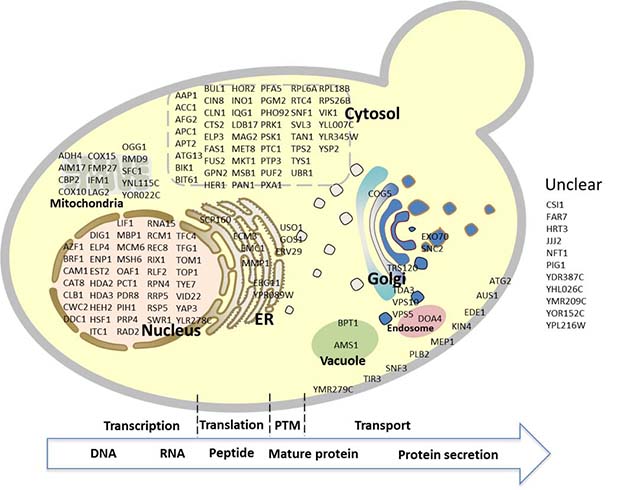Research program 2
Yeast
Currently, about 20% of biopharmaceuticals (biologicals) are being produced by yeast Saccharomyces cerevisiae. More than 40 different recombinant proteins have been expressed in S.cerevisiae, and the dominant biopharmaceuticals produced by this cell factory are insulin (insulin precursors and analogs), human serum albumin, hepatitis vaccines and virus like particles, e.g. for vaccination against human papillomavirus. The advantages of using yeast S. cerevisiae as a cell factory for the production of biopharmaceuticals are that this eukaryal cell enables production and proper folding of many human proteins. Furthermore, the proteins can be secreted to the extracellular medium and this facilitates subsequent purification. Additionally, yeast has been domesticated thousands of years ago and is used for production of food and beverages and has a GRAS (generally regarded as safe) status. Due to its extensive use as a model for cell and molecular biology, many in vivo, in vitro and in silicotools and databases are freely available and the toolboxes are continuously upgraded by an extensive international research community.

In this program we will engineer the yeast secretory pathway for high-level production of a model recombinant protein and then evaluate the hereby generated platform strain for production of a range of different biopharmaceuticals. The engineered yeast strains will be characterized using systems biology approaches, which will involve quantitative proteomics, transcriptomics, metabolomics and detailed mathematical modeling.
The PI of the yeast program is Dr. Verena Siewers, Senior Scientist.
For full CV and list of publications please see www.sysbio.se
Additional scientists financed by CellNova to work on the project are; Prof. Jens Nielsen, Dr. Xin Chen, senior scientist, working full-time on different aspects of proteome homeostasis and PhD student Veronica Gast, working full-time on production of biologicals in yeast.
Other affiliated researchers financed from other projects who are contributing to CellNova are; PhD student Rasool Saghaleyni who is working on mathematical modeling of human cell lines, PhD student Feiran Li who is working on mathematical modeling of protein secretion by yeast and PhD student Yanyan Wang who is working on recombinant protein production by yeast.
CellNova_poster_Area2.pdf (pdf 1.1 MB)

